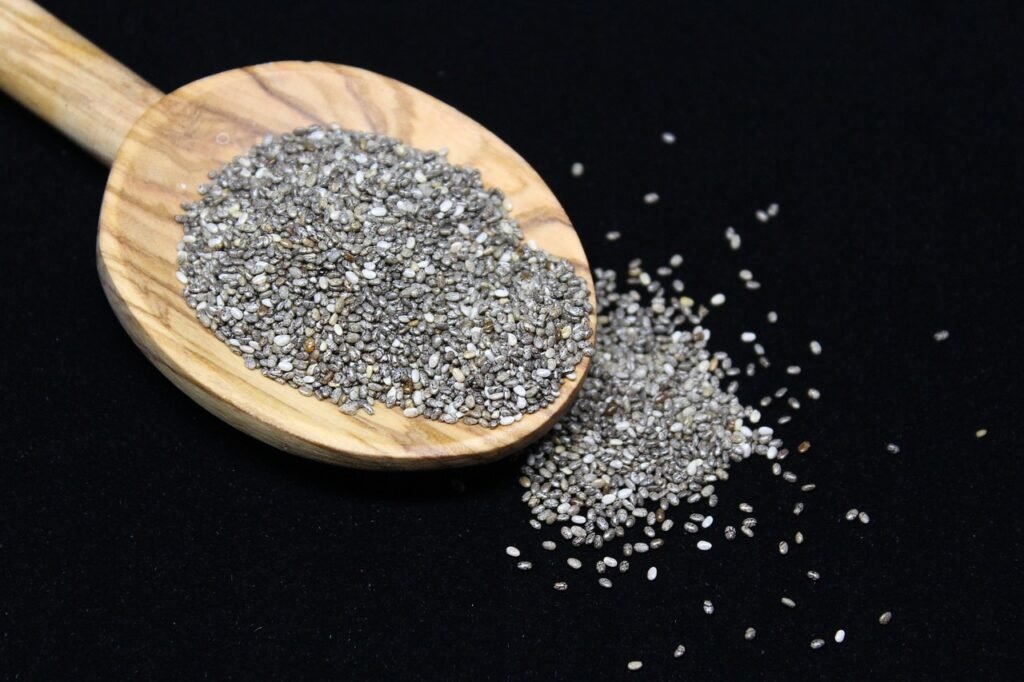
Chia, scientifically known as Salvia hispanica, is herbaceous plant that produces seeds that have been consumed for thousands of years. The term “chia” is derived from the Nahuati language, meaning “oily”.
Nutrients Available in Chia seeds
Chia seeds are rich in protein (15-25%), fat (15-35%), ash (4-6%), dietary fibre (18-35%), and carbohydrates (18-31%).
They are a good source of various vitamins such as vitamin B1 (0.6 mg/100 g), vitamin B2 (0.2 mg/100 g), and niacin (8.8 mg/100 g), as well as minerals like phosphorus (860–919 mg/100 g), calcium (456–631 mg/100 g), potassium (407–726 mg/100g), and magnesium (335–449 mg/100 g).
The omega 3 content in it is 54.08%, omega 6 is 18.69%, and omega 9 is 10.24%.
These seeds have gained popularity among researchers due to their nutritional value and potential health benefits.
They may help combat diseases such as cancer, depression, diabetes, and coronary heart disease, which are prevalent due to unhealthy eating habits.
They can also address issues of malnutrition, particularly among children in developing countries. Consuming it can lead to improved blood levels, blood sugar, blood pressure, and gut health.
Chia Seeds- Incredible Health Benefits
Heart Disease
The presence of α-linolenic acid in it may reduce the risk of heart failure, thanks to its anti-inflammatory and anti-thrombotic properties.
Antioxidant properties
They provide a rich source of antioxidants, which are essential for human health as they counteract harmful free radicals that can cause damage to cells.
The antioxidants found in it, such as chlorogenic acid, caffeic acid, myricetin, quercetin, and kaempferol, have been shown to have protective effects on the heart and liver, as well as potential anticancer properties.
In addition, chlorogenic acid may aid in reducing blood pressure, while caffeic acid has anti-inflammatory properties.
Antioxidants in seeds can help fight inflammation in the body and reduce inflammatory markers when consumed regularly.
Help to lose weight
The fiber and protein content in it can be beneficial for individuals looking to manage their weight.
The dietary fiber in it may help in preventing overweight and obesity, while the protein content could help in reducing appetite and overall food intake.
Although they alone may not lead to weight loss, incorporating them into a well-balanced diet can be a helpful addition for those aiming to shed some pounds
Help to boost bone
They are a good source of nutrients crucial for bone health, including calcium, phosphorus, and magnesium.
The ALA present in it may also contribute to maintaining strong bones.
Regular consumption of it could potentially aid in keeping bones healthy and robust.
Maintain Blood Sugar Level
Consuming chia seeds may assist in regulating blood sugar levels, possibly due to their fiber content and other beneficial compounds.
Studies have shown that they may improve insulin sensitivity, which can help stabilize blood sugar levels post-meals.
For instance, incorporating it into bread has been found to lower the increase in blood sugar levels after meals in healthy adults when compared to bread without it.
